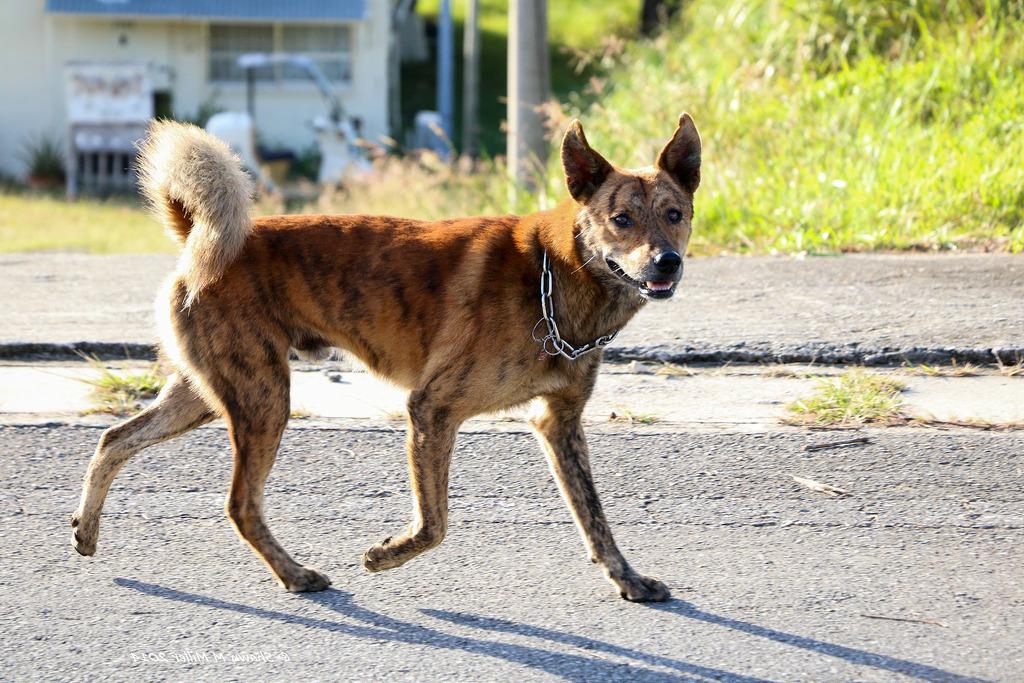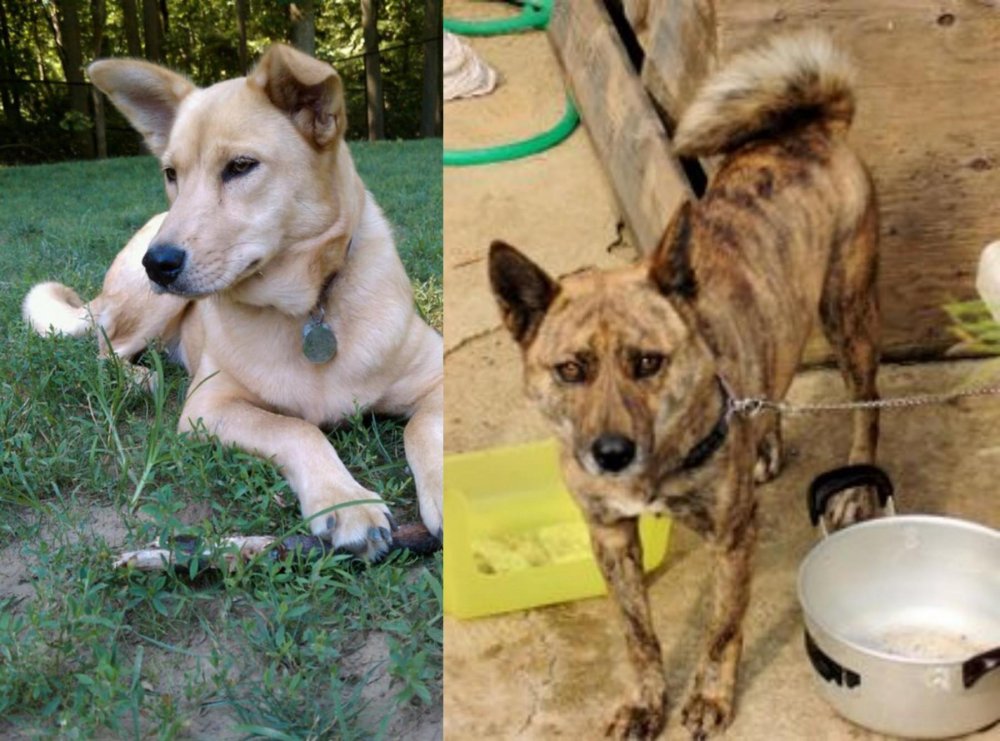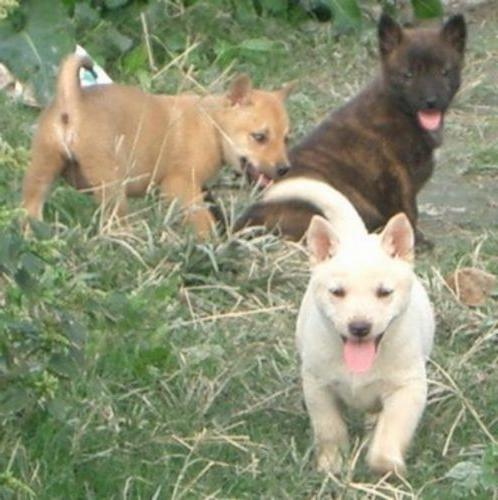- Breed Category: Hunting and companion dog
- Country of Origin: Japan
- Average Height: 46-56 cm (18-22 inches)
- Average Weight: 15-25 kg (33-55 pounds)
- Average Life Span: 12-15 years
- Grooming Requirements: Low; occasional brushing needed
- Exercise Requirements: High; needs daily exercise
- Coat Type: Short and dense
- Coat Color Variations: Brindle, red, black
- Shedding Level: Moderate
- Ear Type: Erect
- Tail Type: Curled over back
- Temperament: Loyal, alert, independent
- Intelligence Level: High
- Barking Tendency: Moderate
- Compatibility with Children: Good with proper socialisation
- Compatibility with Other Pets: Varies; early socialisation helps
- Training Ease: Moderate; can be stubborn
- Common Health Issues: Hip dysplasia, allergies
- Dietary Needs: High-quality dog food recommended
- Energy Level: High
- Drooling Tendency: Low
- Sensitivity to Weather: Tolerates heat better than cold
- Overall Maintenance Level: Moderate
- Original Purpose: Hunting wild boar
- Apartment Friendly: Not ideal; needs space to roam
- Best Suited For: Active families, rural settings
- Cost of Ownership: Moderate; grooming and health care
- Unique Traits: Cat-like agility, climbing ability
- Cultural Significance: Native to Okinawa, Japan
Imagine a dog with a striking appearance, a rich history, and a personality that’s as unique as its homeland. Meet the Ryukyu Inu, a breed that hails from the subtropical islands of Okinawa, Japan. Known for their loyalty and intelligence, these dogs are a rare gem in the canine world.
The purpose of this article is to delve into the fascinating world of the Ryukyu Inu. We’ll explore their distinctive characteristics, trace their historical roots, and provide insights into their care. Whether you’re a seasoned dog owner or just curious about this breed, there’s something here for everyone.
The Ryukyu Inu’s history is as captivating as the islands they come from. These dogs have been companions to the Okinawan people for centuries, playing roles in hunting and guarding. Their resilience and adaptability have allowed them to thrive in the diverse landscapes of their native region.
Early Development and Cultural Significance of the Ryukyu Inu

Early Development of the Breed
The Ryukyu Inu has roots that stretch back to ancient times. Originally bred for hunting, these dogs were adept at navigating the rugged terrain of Okinawa. Their keen senses and agility made them invaluable to the island’s early inhabitants. Over time, selective breeding honed their skills, creating a dog that was not only a hunter but also a loyal companion.
Role in Okinawan Culture and History
In Okinawan culture, the Ryukyu Inu is more than just a pet. These dogs have been woven into the fabric of daily life, often seen as protectors and symbols of good fortune. Their presence in folklore and local traditions highlights their importance to the community. They are a living link to the island’s past, embodying the spirit and resilience of the Okinawan people.
Key Historical Figures and Events
Throughout history, several key figures have contributed to the preservation and recognition of the Ryukyu Inu. Local breeders and enthusiasts have worked tirelessly to maintain the breed’s purity and promote its unique qualities. Events such as breed exhibitions and cultural festivals have played a significant role in raising awareness and appreciation for these remarkable dogs.
Physical Characteristics
The Ryukyu Inu is a medium-sized dog with a distinctive appearance. They have a short, dense coat that comes in various colours, often with striking brindle patterns. Their ears are typically upright, giving them an alert and attentive expression. With a strong, athletic build, these dogs are well-suited to the active lifestyle they were bred for.
Unique Physical Traits
One of the standout features of the Ryukyu Inu is their remarkable agility. These dogs are built for movement, with a nimble frame that allows them to navigate challenging terrains effortlessly. Their adaptability is another key trait, making them well-suited to various environments, from dense forests to open fields. This versatility is a testament to their historical role as hunters and companions in Okinawa.
Temperament and Behaviour
When it comes to temperament, the Ryukyu Inu is known for its intelligence and loyalty. These dogs form strong bonds with their families, often displaying a protective nature. They are alert and attentive, making them excellent watchdogs. However, they also have a playful side, enjoying interactive games and activities. Socialisation from a young age is important to ensure they are well-adjusted and confident in different situations. With the right training and care, they can be both a loving family pet and a vigilant guardian.
Personality Traits and Suitability
Typical Personality Traits
The Ryukyu Inu is a breed that stands out for its loyalty, intelligence, and independence. These dogs are fiercely devoted to their families, often forming deep bonds that last a lifetime. Their intelligence makes them quick learners, eager to pick up new commands and tricks. However, their independent streak means they appreciate having their own space and can sometimes be a bit stubborn.
Suitability as a Family Pet and Working Dog
As a family pet, the Ryukyu Inu is a fantastic choice. They are protective yet gentle, making them great companions for households with children. Their history as working dogs means they thrive when given a job to do, whether it’s guarding the home or participating in dog sports. Their versatility makes them suitable for both family life and more active, task-oriented roles.
Interaction with Children and Other Animals
Ryukyu Inus are generally good with children, especially if they are socialised from a young age. They tend to be patient and playful, enjoying the company of kids. When it comes to other animals, early socialisation is key. They can coexist peacefully with other pets, but their hunting instincts may sometimes come into play, so supervision is recommended.
Training and Exercise Needs
Training a Ryukyu Inu requires consistency and patience. Their intelligence means they pick up commands quickly, but their independent nature can sometimes lead to selective hearing. Positive reinforcement works best. In terms of exercise, these dogs need plenty of it. Regular walks, playtime, and mental stimulation are essential to keep them happy and healthy. A bored Ryukyu Inu can become destructive, so keeping them engaged is crucial.
Training, Exercise, and Health of the Ryukyu Inu

Importance of Early Training and Socialisation
Starting early with training and socialisation is crucial for the Ryukyu Inu. These dogs are intelligent and eager to learn, but they also have an independent streak. Early exposure to different environments, people, and other animals helps them grow into well-rounded adults. This foundation is key to managing their protective instincts and ensuring they are confident in various situations.
Recommended Training Techniques
When it comes to training, positive reinforcement is the way to go. Reward-based methods, using treats and praise, work wonders with this breed. Consistency is important, as is keeping sessions short and engaging to hold their attention. Patience is essential, as their independent nature can sometimes lead to stubbornness.
Daily Exercise Requirements and Activities They Enjoy
The Ryukyu Inu is an active breed that thrives on regular exercise. They need daily walks, playtime, and mental challenges to stay happy. Activities like agility courses, fetch, and interactive games are perfect for them. Without enough exercise, they can become bored and potentially destructive, so keeping them busy is key.
Health and Lifespan
Generally healthy, the Ryukyu Inu has a lifespan of around 12 to 15 years. Regular vet check-ups, a balanced diet, and plenty of exercise contribute to their well-being. Like all breeds, they can be prone to certain genetic conditions, so responsible breeding and regular health screenings are important.
Health and Care of the Ryukyu Inu

Common Health Issues
Ryukyu Inus are generally robust, but like any breed, they can face certain health challenges. Hip dysplasia and allergies are among the more common issues. Regular vet visits and early detection are key to managing these conditions effectively.
Average Lifespan and Health Tips
With proper care, a Ryukyu Inu can live between 12 to 15 years. To keep them healthy, ensure they have a balanced diet, regular exercise, and mental stimulation. These elements are crucial for their physical and emotional well-being.
Preventative Care Recommendations
Preventative care is essential. Regular vaccinations, flea and tick prevention, and dental care should be part of their routine. Annual health screenings can catch potential issues early, ensuring a long, healthy life.
Grooming and Maintenance
The Ryukyu Inu’s short, dense coat requires minimal grooming. Weekly brushing helps remove loose hair and keeps their coat healthy. Regular nail trimming and ear cleaning are also important to prevent infections and maintain overall hygiene.
Coat Care and Grooming Routines

Shedding and Seasonal Grooming Tips
The Ryukyu Inu’s coat is short and dense, making it relatively low-maintenance. However, they do shed, especially during seasonal changes. Regular brushing, at least once a week, helps manage shedding and keeps their coat looking its best. During peak shedding seasons, you might want to increase brushing to a few times a week to keep loose hair under control.
Bathing should be done as needed, typically every few months, unless they get particularly dirty. Use a gentle dog shampoo to maintain their skin’s natural oils. Regular nail trimming and ear cleaning are also essential parts of their grooming routine to prevent infections and maintain overall health.
Diet and Nutrition
A balanced diet is crucial for the Ryukyu Inu’s health and vitality. High-quality dog food, rich in protein and essential nutrients, supports their active lifestyle. It’s important to monitor their weight and adjust portions as needed to prevent obesity, which can lead to health issues like joint problems.
Incorporating fresh fruits and vegetables as treats can provide additional vitamins and minerals. Always ensure they have access to fresh water, especially after exercise. Consulting with a vet for personalised dietary recommendations can help tailor their nutrition to their specific needs.
Nutritional Needs and Feeding Guidelines for the Ryukyu Inu

Nutritional Needs for Optimal Health
Feeding your Ryukyu Inu a balanced diet is key to their health and happiness. These active dogs thrive on high-quality dog food rich in protein, which supports their muscular build and energy levels. Look for foods that include essential fatty acids, vitamins, and minerals to keep their coat shiny and their immune system strong.
Foods to Include and Avoid
Include lean meats, fish, and whole grains in their diet. Fresh fruits and vegetables can be great treats, offering extra nutrients. Avoid foods high in fillers, artificial additives, and excessive fats, as these can lead to obesity and other health issues.
Feeding Schedules and Portion Recommendations
Establish a consistent feeding schedule, typically twice a day, to maintain their energy levels. Portion sizes should be adjusted based on their age, weight, and activity level. Consult your vet for specific recommendations tailored to your dog’s needs.
Fun Facts and Trivia
Did you know the Ryukyu Inu is one of the rarest dog breeds in the world? Their unique brindle coat patterns are not just beautiful but also serve as natural camouflage in their native Okinawan forests. These dogs are not only agile hunters but also have a knack for climbing trees!
Interesting Tidbits and Famous Ryukyu Inu in Media

Interesting Tidbits about the Ryukyu Inu
The Ryukyu Inu is a breed full of surprises. One of their most fascinating traits is their ability to climb trees, a skill that harks back to their hunting days in the dense forests of Okinawa. This agility is not just a party trick; it’s a testament to their adaptability and intelligence. Their unique brindle coat patterns are not only striking but also serve as natural camouflage, helping them blend seamlessly into their surroundings.
Another interesting fact is their rarity. The Ryukyu Inu is considered one of the rarest dog breeds globally, making them a true treasure for dog enthusiasts. Their rarity adds to their allure, as owning one is like having a piece of living history.
Famous Ryukyu Inu in Media or History
While the Ryukyu Inu may not be as widely recognised in mainstream media as some other breeds, they hold a special place in Okinawan culture and history. These dogs have been featured in local folklore and stories, often depicted as loyal companions and protectors. Their presence in cultural festivals and exhibitions highlights their significance and helps keep their legacy alive.
In recent years, efforts to promote the breed have seen them featured in documentaries and articles, showcasing their unique qualities and historical importance. These appearances have helped raise awareness and appreciation for the Ryukyu Inu beyond their native islands.
Final Thoughts

The Ryukyu Inu is a rare and remarkable breed. With its unique blend of loyalty, intelligence, and agility, this dog is both a treasured companion and a symbol of Okinawan heritage. Owning a Ryukyu Inu offers a rewarding experience, balancing the joys of companionship with the responsibilities of care and training. As you consider welcoming this breed into your life, remember the importance of early socialization and consistent exercise to unlock their full potential. Embrace the journey with a Ryukyu Inu, and discover a loyal friend and guardian for years to come.
